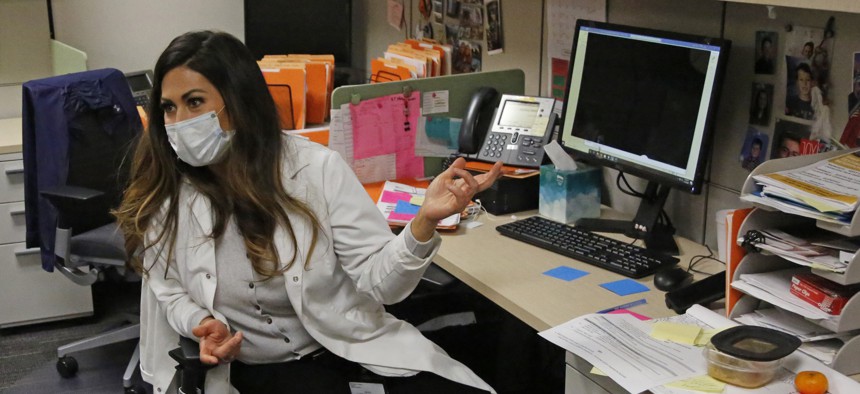Ramping Up Efforts to Trace the Coronavirus

A health investigator sits at her desk at the Salt Lake County health department. AP PHOTO/RICK BOWMER

Connecting state and local government leaders
COMMENTARY | State and local officials should use the tools they have now to identify, isolate and track the localized outbreaks of Covid-19 that will likely occur in the months ahead.
The race between us and the coronavirus will come down to the finish line. It’s a race to identify, isolate, track and destroy the virus. But in most states, the virus is still winning. It doesn’t need to be this way.
Even as scientists work to develop cures and vaccines, we already have the best tools to identify, isolate and track a deadly outbreak, such as instantaneous communications, location technology and the internet.
Our problem is not a lack of tools, it’s a lack of effective governing. And that problem is two-fold. First, we have a bad case of the “slows” when it comes to deploying proven technologies and solutions. We consistently drag our feet when swift action is required. Second, there is a lack of trust in our leaders, making it difficult for people to embrace advice that help keep us all safe and healthy.
For better or worse, the buck has been passed to state and local officials. Case in point, the House Energy and Commerce Committee recently recommended that, “Congress should develop a national program to track, identify, and isolate all possible traces of this disease. If we attempted to reopen this country without a sweeping approach that matches the magnitude of the crisis, more Americans will unnecessarily die.”
Well said. But it’s unlikely that Congress or the Trump Administration will do that anytime soon.
Therefore, our ability to save lives and avert a total economic collapse will depend on the speed of state and local and governments to identify, isolate and track Covid-19. It’s time to act. Federal dollars are essential, but the execution falls to state and local governments, which enjoy high degrees of civic trust and are the places where most innovations in American governing are happening anyway.
While testing slowly increases to meet demand, there are four additional actions our state and local leaders can take right now to fix this plane even as we fly it:
Hire and train contact tracers now: Congress has already appropriated enough money for states, larger cities and counties to hire a small army of contact tracers. Millions of Americans have lost their jobs and want to make a difference. So, hire them—the young, the motivated and the competent—and do it now. The tools, technology and training we provide them will improve as the battle progresses. There is plenty of work to be done in the meantime.
Immediately create a wellness surveillance system: Get a jump locally on any new outbreak in order to contain it. For example, conducting a geographically and demographically balanced sampling of households would provide a real-time and statistically representative daily reading on the health and well-being of any city, county or state. Ask citizens to be a part of it. These systems can be kick-started with a simple app, four questions and a civic duty to report. Household information can be kept anonymous. It would be shared with public health professionals only as needed. And it would be shared with the public only down to the neighborhood or zip code level.
Use 911 and 311 systems to survey, communicate and alert for new outbreaks: Technology has provided government the ability to not just respond to calls for service but to also alert citizens of impending threats, such as a fire or flood. Location technology systems, 911 and its “all-services” progeny like 311, should be deployed as a vital public alert system in the fight against coronavirus flare-ups. Just like the phone alerts we receive to warn of dangerous weather events, these systems have the ability to send targeted and urgent messages to exactly the right areas of a state, county or city, to help neighbors contain future outbreaks.
Use cell phone location technology to speed contact tracing: Location technology embedded in our phones can tell us a tremendous amount, like the numbers of the other cellphones I came within six feet of on my nightly walk. We must use that technology responsibly in contact tracing.
Concerns about privacy and freedom of association should be openly and legally addressed especially in light of the recent protests over the killing of George Floyd which have stoked fears that information gleaned for contact tracing could also be used by law enforcement as a means of surveillance. It will be critical that the openness of this data be limited to only public health professionals for only the duration of the emergency, with the mandate to scrub after a certain period of time.
Once some city, county or state leads on this, others will follow. When a governor, mayor or county executive petitions a court to allow the use of cell-phone location technology to identify, isolate and contain localized outbreaks, I believe they will win.
Ultimately, this race ends when we discover an effective vaccine. But in the meantime, we are in fire suppression mode. And many lives are at stake. Governors, mayors and county executives already have plenty of tools at their disposal to fight the localized outbreaks that are inevitably coming.
And right now, most Americans have greater trust in them than they do in our national government. So, let’s go. This is no time for the “slows."
Martin J. O’Malley, the former Governor of Maryland, is now Senior Advisor for Smart Governance with Grant Thornton LLP and the author of “Smarter Government: How to Govern for Results in the Information Age.”

NEXT STORY: Police Reform Is Popular. Rioting Is Not.


